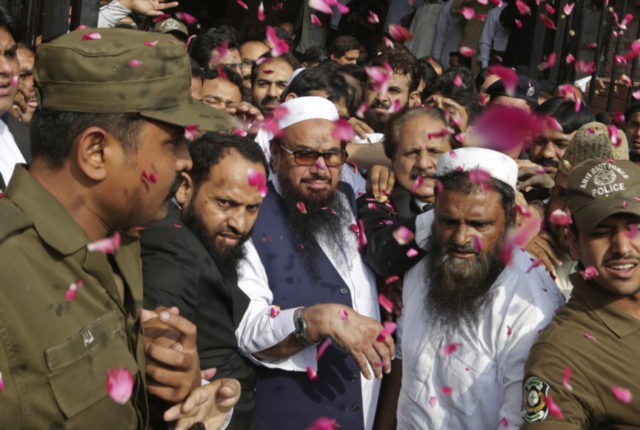The United States and United Kingdom, backed by France and Germany, have introduced a motion to add Pakistan to the international Financial Action Task Force (FATF) list of terrorist-financing countries.
The motion would come before the FATF at its meeting next week in Paris, where the organization is based. If passed, it would declare Pakistan to be in non-compliance with global terrorist financing regulations, specifically because it has not taken necessary steps to interrupt the flow of money to extremist groups.
Naturally, Pakistan is working to avoid this designation, not least because it would trigger banking regulations and additional layers of scrutiny that would make foreign investment in Pakistan much harder, with commensurate damage to the national economy.
“We are now working with the U.S., UK, Germany, and France for the nomination to be withdrawn. We are also quite hopeful that even if the U.S. did not withdraw the nomination that we will prevail and not be put on the watchlist,” Pakistan’s de facto finance minister Miftah Ismail told Reuters in a telephone interview on Tuesday.
A senior U.S. official countered that Pakistan, which has already been on the watchlist once between 2012 and 2015, has been much too “selective” in combating militant groups.
“It is time for that to stop, and so we are working with our allies, who also are affected, to see effective action against groups such as the Haqqanis and elements of the Taliban,” the official said.
“The U.S. has consistently expressed our long-standing concern about ongoing deficiencies in Pakistan’s implementation of its anti-money laundering/counter-terrorism finance regime,” U.S. State Department spokeswoman Heather Nauert said on Wednesday.
“In addition to broader systemic concerns, this also includes Pakistan’s non-compliance with its commitments under U.N. Security Council Resolution 1267,” the official added. This resolution called upon all U.N. member nations to freeze the assets of individuals and entities associated with al-Qaeda and the Taliban.
The FATF does not have the power to impose sanctions itself, but its “grey list” and “black list” of countries with money laundering and terrorist financing problems are very influential with international financial institutions.
The Pakistani newspaper Dawn reports that Pakistani President Mamnoon Hussain is pushing amendments to the country’s Anti-Terrorism Act of 1997 that would prohibit several groups classified as terrorists by the U.N. Security Council. Among them is Jamaat-ud-Dawah, whose leader Hafiz Saeed has been accused of masterminding the 2008 Mumbai terror attack by India.
On Wednesday, Pakistan officially banned two charity organizations linked to Saeed, in what might have been an effort to head off action by the FATF. Saeed is reportedly the focus of the motion introduced by the U.S. and United Kingdom.
The Times of India (TOI) was not much impressed by Pakistan’s actions, accusing India’s rival of merely “pretending” to roll up Saeed’s network and putting on a “big show” to placate the international community.
However, the TOI credited President Donald Trump’s tough approach to Pakistan with finally forcing some real changes in how the Pakistani government handles extremist groups.
Over at the Business Standard, Pakistan is seen as folding under U.S. pressure and getting tough with terrorists because China did not ride to Islamabad’s rescue as hoped. At a November plenary meeting of the FATF, China “found itself isolated” when all of the other member nations supported India’s complaints against Pakistan.

COMMENTS
Please let us know if you're having issues with commenting.